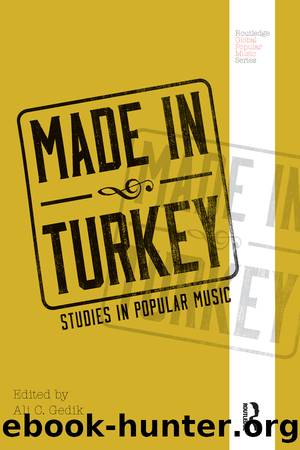Made in Turkey by Gedik Ali C.;

Author:Gedik, Ali C.;
Language: eng
Format: epub
Publisher: Taylor & Francis Group
A Global World Music Discourse?
From an academic viewpoint, efforts in the 1990s to examine world music led to the question of whether or not the phenomenon can be explored systemically (i.e., in relation to current global contexts) or if it should instead focus on specific case analyses. Veit Erlmann and Mark Slobin, respected experts whose world music research first paved the way for subsequent critical exploration, capture these perspectives well. Erlmann (1994, 166) references Fredric Jamesonâs work regarding the production of difference (Jameson 1991) in likening the emergence of world music to the âaesthetic production of difference,â a concept informed by two particular aspects of global culture: âcommodity production and the way in which differentiation is written into the very structural logic of late capitalism.â1
To put it another way, commodity production has married differentiation and homogenization that ânow comfortably reside as members of the same familyâ (Erlmann, 1996, 473). Slobin (1992, 5), on the other hand, argues against âa hidden agency which controls the flow of culture in a global world.â2 In emphasizing instead the malleable boundaries that follow from deterritorialization in todayâs globalized world, Slobin turns his attention to local project-analysis in which listeners and musicians alike create meaning, and form micromusical scenes, in global contexts. Whereas Slobin objects to the framing of world music as a direct representation of an overarching global system that overlooks local specificities, Erlmann contends that case analysis overemphasizes the local as a place of resistance in light of its relative autonomy. These distinct discourses have informed much of the existing world music literature.
On a related note, Feld (2000) proposes that world music perspectives can generally be considered either anxious or celebratory narratives. The earliest versions of the former were largely colored by cultural imperialism3: They investigated how indigenous and non-Western music had been exploited, packaged, and appropriated in the name of world music. In this vein, Tony Mitchell (1996, 1) explains that proponents of cultural imperialism emphasize Anglo-American industrial trade-routes as a source of cultural imperialism, which âdisplace and appropriate authentic representations of local and indigenous music into packaged commercial products commodified for ethnically indeterminate, but predominantly Anglocentric and Eurocentric, markets.â
Theoretically, however, many scholars have questioned cultural imperialismâs cursory explanation of the intricacies of the global system (i.e., power struggles and cultural evolution). Their skepticism is warranted given the perspectiveâs black-and-white representation of oppositions: Commodified and global versus authentic and local. Mitchell (ibid, 51) contends that the relationship between the so-called center and periphery is more nuanced, âalways mediated by complex interplays of intercultural cross-fertilizations.â Martin Stokes (2012, 109) echoes this perspective, suggesting that cultural imperialism âassumes a simple causal linkage between technologies of sound production, musical styles ⦠and a variety of political and aesthetic effectsâ although these associations are âcomplex and many-stranded.â Similarly, as Arjun Appadurai (1996) states, global forms, practices, and discourses are somehow indigenized in the âlocal,â a process that cannot be reduced to either/or propositions such as local/global or center/periphery.
Others have proposed more refined anxious narratives that speak to the power differential in world musicâs production and consumption.
Download
This site does not store any files on its server. We only index and link to content provided by other sites. Please contact the content providers to delete copyright contents if any and email us, we'll remove relevant links or contents immediately.
Kathy Andrews Collection by Kathy Andrews(10519)
The remains of the day by Kazuo Ishiguro(7551)
Spare by Prince Harry The Duke of Sussex(4195)
Paper Towns by Green John(4169)
The Body: A Guide for Occupants by Bill Bryson(3800)
Be in a Treehouse by Pete Nelson(3211)
Harry Potter and the Goblet Of Fire by J.K. Rowling(3041)
Goodbye Paradise(2961)
Never by Ken Follett(2879)
Into Thin Air by Jon Krakauer(2700)
The Remains of the Day by Kazuo Ishiguro(2617)
The Genius of Japanese Carpentry by Azby Brown(2608)
The Cellar by Natasha Preston(2594)
Drawing Shortcuts: Developing Quick Drawing Skills Using Today's Technology by Leggitt Jim(2532)
120 Days of Sodom by Marquis de Sade(2435)
Architecture 101 by Nicole Bridge(2350)
The Man Who Died Twice by Richard Osman(2297)
Machine Learning at Scale with H2O by Gregory Keys | David Whiting(2289)
Fairy Tale by Stephen King(2068)
